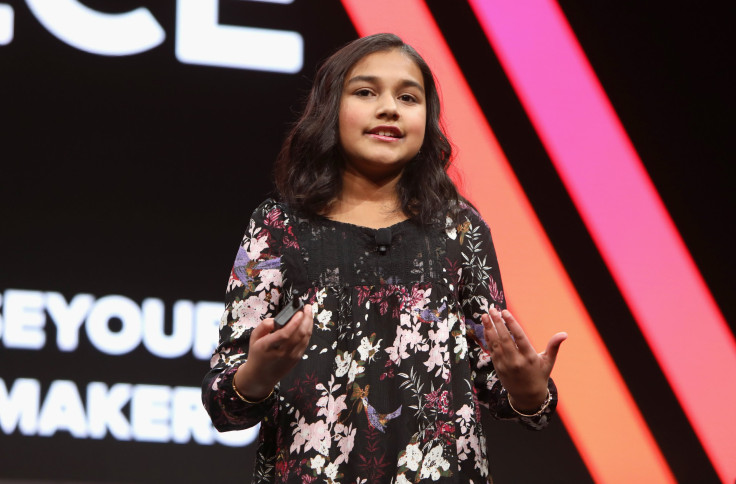Who Is Gitanjali Rao? Meet TIME's 'Kid Of The Year'
KEY POINTS
- TIME magazine has selected their first "kid of the year," indicating a new emphasis on young innovators and activists
- The first winner is Gitanjali Rao, a California problem-solver tackling everything from water quality to cyberbullying
- Other winners were notable for overcoming great hardship or taking direct action to resolve problems in their communities
TIME magazine is mixing things up by selecting a kid of the year for the first time. The first-place prize went to Gitanjali Rao, a 15-year-old scientist, inventor and engineer in Colorado. The runners up were no slouches either, with a couple of different factors considered when it came to the honorees: young people who overcame great hardship or saw a problem and decided to take action themselves.
Rao has been interested in scientific problem-solving since early on, telling her mother at the age of ten that she wanted to know more about the use of carbon nanotubes to monitor water quality at Denver’s water quality research lab.
Her current main project is also about water quality, using genetic markers this time, but her interests extend well beyond that. Rao used a word association algorithm to figure out what vocabulary was associated with cyberbullying and turned that database into an app that can tell young people if the message they’re about to send is too harsh. Another of her projects detects signs of opioid addiction early.
Rao says that young people should follow her eclectic approach, looking for problems in their communities that they’re passionate about. She developed her personal method into a shorter seminar that helps kids find their own problems to solve. She says her motivation is an intrinsic desire to better the lives of the people around her.
“There wasn’t really one specific ‘aha’ moment. I was always someone who wanted to put a smile on someone’s face,” Rao said in a recent interview with TIME. “That was my everyday goal, just to make someone happy. And it soon turned into, ‘How can we bring positivity and community to the place we live?’”

TIME’s article also devoted much of its space to the young people that didn’t quite get the top prize. Several were notable for rising above hard circumstances, like Tyler Gordon of California. As a young child, he was vitamin D deficient and spend years in a wheelchair. He was born deaf and bullied so badly that he stopped talking in elementary school. Nevertheless, Gordon found an outlet in painting that he eventually used for social activism.
Jordan Reeves was born with a left arm that never went past her elbow but turned that into a passion for designing better prostheses. She’s started a nonprofit to help the disabled called Born Just Right.
Another factor that received honors was the decision to take personal action after seeing a problem in one’s community. Ian McKenna heard that kids at his Austin school were going hungry, and wondered if his penchant for gardening could do something about it. Now his backyard garden has extended to five schools and yields thousands of pounds of produce.
Bellen Woodard is the youngest inclusion at only ten years old, but already she’d noticed that “skin-tone” crayons were limited to light colors and worked to make her own set that reflected her own experience. Her efforts sparked a non-profit to teach inclusivity and produce crayons for schoolchildren nationwide.
The newest generation faces a great number and diversity of problems, with a looming climate catastrophe and unchecked social media systems. TIME’s newest entries give hope that the ingenuity and drive of the youngest might rise to meet the occasion.
“So much of what my generation should be doing is just making sure we do as little damage as possible to ensure that the next generation can take the lead,” said Angelina Jolie, the actor who conducted Rao’s interview. “Your generation is unique. You don’t just accept what’s being put forward, but really question it, and that’s so important.”
© Copyright IBTimes 2025. All rights reserved.





















